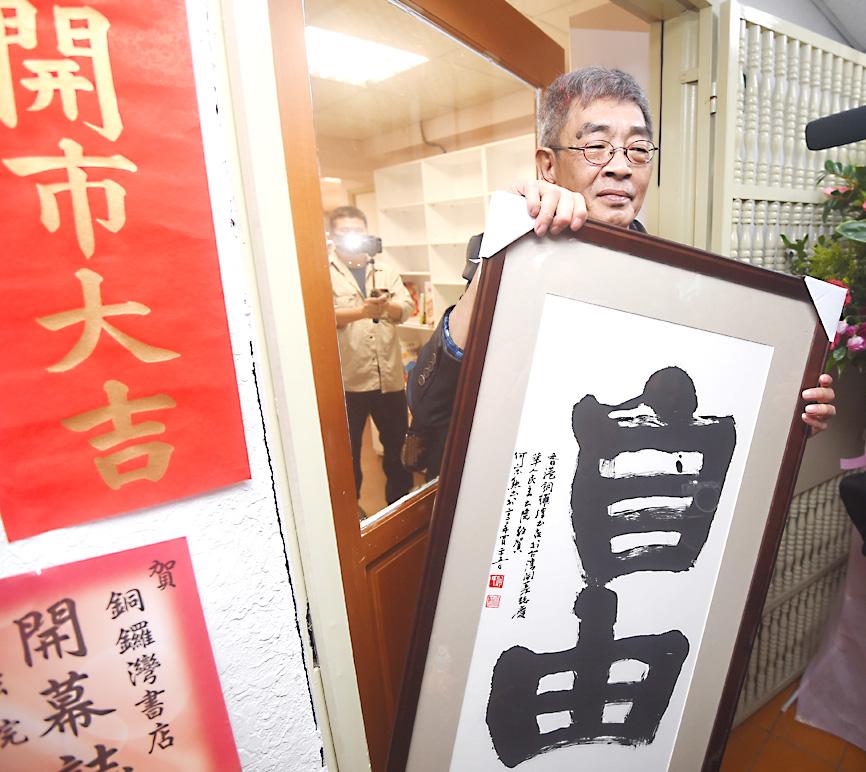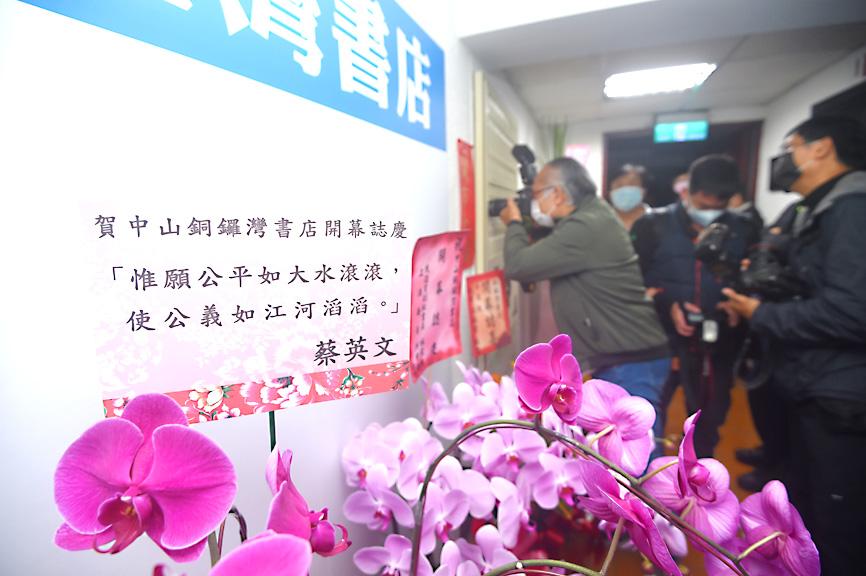Taiwan is the “last fortress” for Hong Kong residents in the face of Chinese oppression, Causeway Bay Books (銅鑼灣書店) manager Lam Wing-kei (林榮基) said yesterday, calling on fellow Hong Kongers to escape from the territory and join the resistance “from the outside.”
Lam made the remarks at the launch of his bookstore in Taipei when asked by reporters whether he sees in Hong Kong the same hope that he said he saw in Taiwan.
Lam — who was manager of Hong Kong’s Causeway Bay Books, which was founded in 1994 and sold work critical of Chinese leaders — fled to Taiwan in April last year amid fears of persecution by Beijing.

Photo: Fang Pin-chao, Taipei Times
The Taipei bookstore opened yesterday after raising nearly NT$6 million (US$199,468) through a crowdfunding Web site from September to November last year.
It is difficult to compare Hong Kong to Taiwan, as unlike Taiwanese, Hong Kongers are not protected by a military, Lam said.
“In a place that has fallen victim to oppression and where personal safety is a concern, young Hong Kongers should seriously consider leaving that dangerous place and rebel from the outside,” he said.

Photo: Fang Pin-chao, Taipei Times
“For example, I opened a bookstore [outside of Hong Kong] as a way of rebelling,” he added.
“A rebellion does not stop after three, five or 10 years,” Lam said. “We should plan for the long haul.”
Asked whether he thought it was lenient to allow bail for three people suspected of splashing red paint on him, Lam said that Taiwan is still the last refuge for Hong Kongers.
“If Hong Kongers encountered the same oppression as I have, at least they would still have a place to go — Taiwan,” he said, thanking the government for all that it has done to shelter him and his friends who would otherwise not be safe in Hong Kong.
Asked if he supported the New Power Party’s call to amend Article 18 of the Act Governing Relations with Hong Kong and Macau (香港澳門關係條例) to officially give Hong Kongers the ability to seek political asylum in Taiwan, Legislative Speaker You Si-kun (游錫堃), who attended the store’s opening, said that he supports any legislation that would make Taiwan a fairer and more just, liberal and democratic nation that could further advance human rights.
Secluded on the 10th floor of an unassuming office building on Nanjing W Road in Taipei’s Zhongshan District (中山), the new iteration of Causeway Bay Books features cozy colors, a clean layout and a brightly lit reading area that belies the underwhelming facade of the building housing it.
Hsu Shih-hsun (徐仕勛) and Wang Tsung-fan (王宗凡), 16, said that they traveled from Taoyuan to visit the bookstore, where they hoped to purchase books that are banned in Hong Kong.
Hsu said that he was moved to see Lam have the courage to reopen the bookstore after being persecuted by the Chinese government and terrorized by alleged gangsters, adding that Lam’s decision to settle in Taiwan made him feel proud to be Taiwanese.

CHAOS: Iranians took to the streets playing celebratory music after reports of Khamenei’s death on Saturday, while mourners also gathered in Tehran yesterday Iranian Supreme Leader Ayatollah Ali Khamenei was killed in a major attack on Iran launched by Israel and the US, throwing the future of the Islamic republic into doubt and raising the risk of regional instability. Iranian state television and the state-run IRNA news agency announced the 86-year-old’s death early yesterday. US President Donald Trump said it gave Iranians their “greatest chance” to “take back” their country. The announcements came after a joint US and Israeli aerial bombardment that targeted Iranian military and governmental sites. Trump said the “heavy and pinpoint bombing” would continue through the week or as long

TRUST: The KMT said it respected the US’ timing and considerations, and hoped it would continue to honor its commitments to helping Taiwan bolster its defenses and deterrence US President Donald Trump is delaying a multibillion-dollar arms sale to Taiwan to ensure his visit to Beijing is successful, a New York Times report said. The weapons sales package has stalled in the US Department of State, the report said, citing US officials it did not identify. The White House has told agencies not to push forward ahead of Trump’s meeting with Chinese President Xi Jinping (習近平), it said. The two last month held a phone call to discuss trade and geopolitical flashpoints ahead of the summit. Xi raised the Taiwan issue and urged the US to handle arms sales to

State-run CPC Corp, Taiwan (CPC, 台灣中油) yesterday said that it had confirmed on Saturday night with its liquefied natural gas (LNG) and crude oil suppliers that shipments are proceeding as scheduled and that domestic supplies remain unaffected. The CPC yesterday announced the gasoline and diesel prices will rise by NT$0.2 and NT$0.4 per liter, respectively, starting Monday, citing Middle East tensions and blizzards in the eastern United States. CPC also iterated it has been reducing the proportion of crude oil imports from the Middle East and diversifying its supply sources in the past few years in response to geopolitical risks, expanding

Pro-democracy media tycoon Jimmy Lai’s (黎智英) fraud conviction and prison sentence were yesterday overturned by a Hong Kong court, in a surprise legal decision that comes soon after Lai was jailed for 20 years on a separate national security charge. Judges Jeremy Poon (潘兆初), Anthea Pang (彭寶琴) and Derek Pang (彭偉昌) said in the judgement that they allowed the appeal from Lai, and another defendant in the case, to proceed, as a lower court judge had “erred.” “The Court of Appeal gave them leave to appeal against their conviction, allowed their appeals, quashed the convictions and set aside the sentences,” the judges